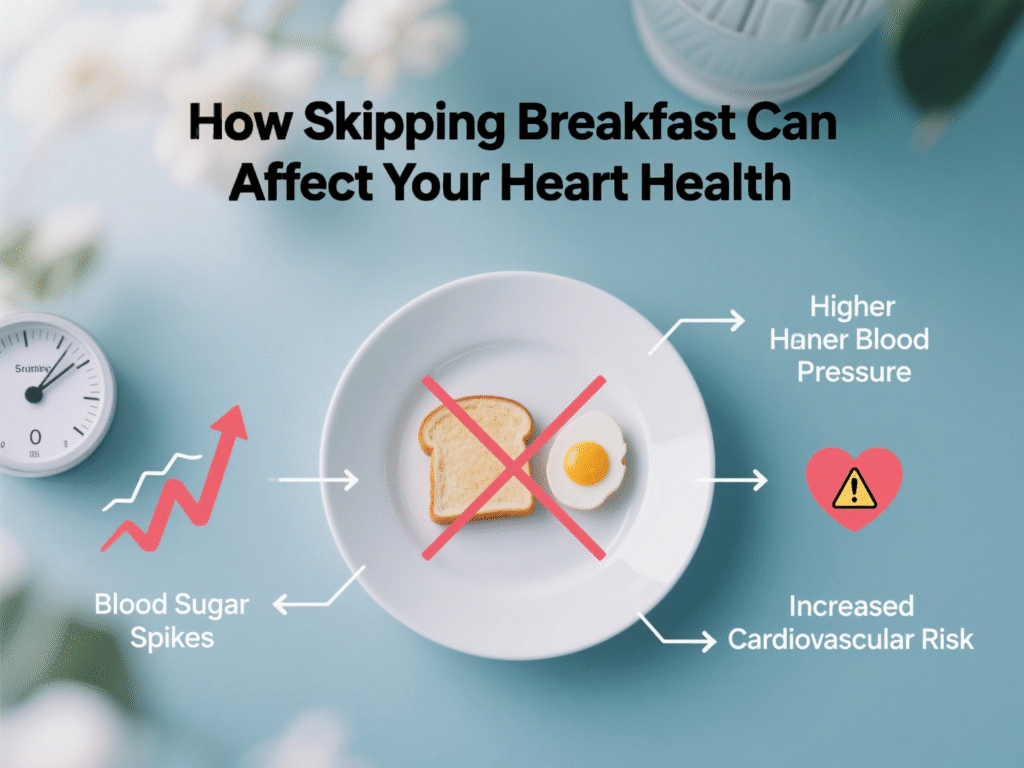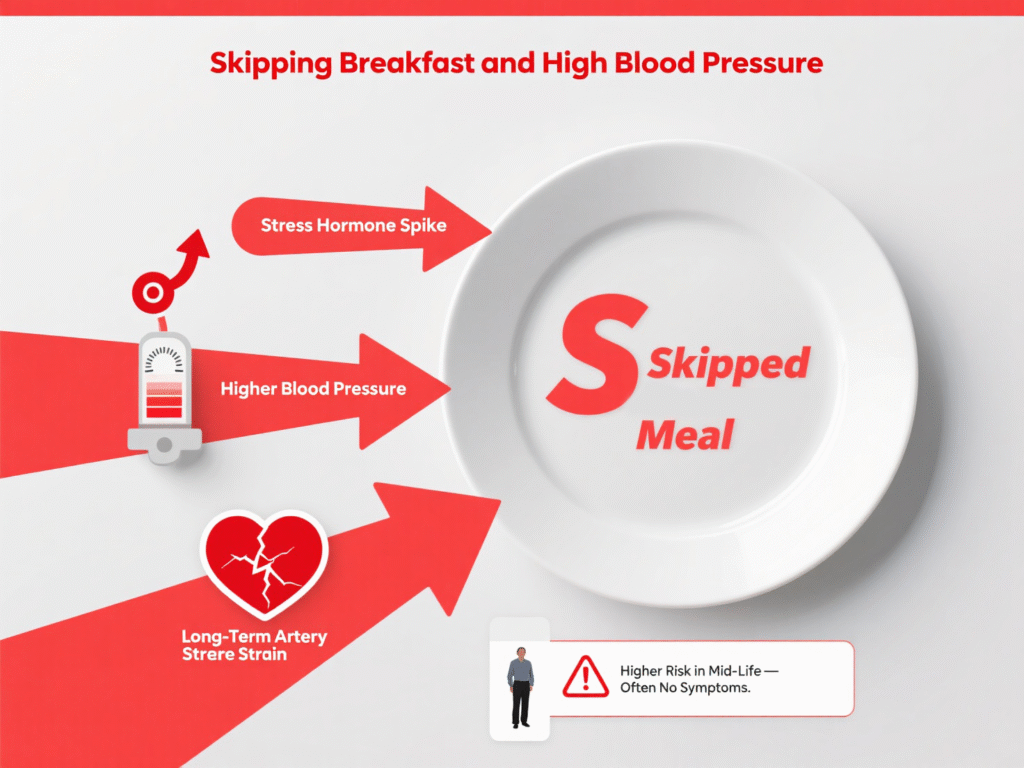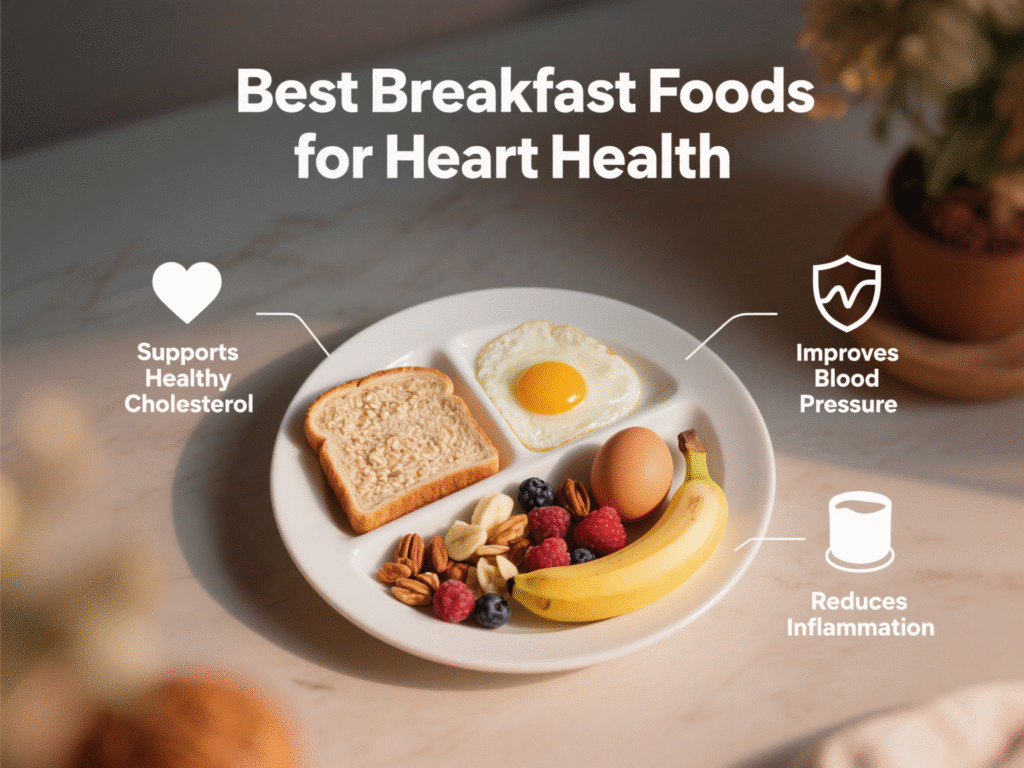How Skipping Breakfast Can Affect Your Heart Health

Skipping breakfast might sound harmless, especially if you’re rushing to work or trying out intermittent fasting. But what if I told you that regularly missing your morning meal could quietly be putting stress on your heart? Science shows a strong connection between breakfast habits and cardiovascular health. Let’s break down why that morning plate of food isn’t just about curbing hunger—it’s about protecting your heart.
Why Breakfast is Called the “Most Important Meal of the Day”
Breakfast literally means “breaking the fast.” After sleeping 7–8 hours, your body has gone without nutrients and energy for an extended period. Having a balanced morning meal restores glucose levels, fuels metabolism, and sets the tone for hormonal balance throughout the day. Without it, your heart and circulatory system are forced to adapt to stress, often in unhealthy ways.
The Link Between Breakfast and Heart Function
Your heart is like an engine—it needs fuel to run efficiently. Breakfast provides essential nutrients that help regulate blood flow, oxygen delivery, and energy production. Skipping it can make your heart “idle” on empty, pushing it to work harder and increasing long-term cardiovascular strain.
Blood Sugar Fluctuations and Your Cardiovascular System
When you skip breakfast, your blood sugar drops, which forces your body to release stress hormones like cortisol and adrenaline. This hormonal spike triggers inflammation and raises heart rate, which can gradually damage blood vessels.
Insulin Resistance from Skipping Meals
Constantly skipping breakfast contributes to insulin resistance—the body’s reduced ability to manage glucose. Insulin resistance is one of the stepping stones to type 2 diabetes, which significantly increases the risk of heart disease.
Morning Energy Crash and Its Effects on the Heart
If you’ve ever felt shaky or irritable after skipping breakfast, that’s your body signaling a lack of energy. This crash places stress on the cardiovascular system, pushing your heart to maintain balance when energy reserves are low.
Skipping Breakfast and High Blood Pressure

Research has shown that breakfast skippers are more likely to develop hypertension. Why? Because missing meals spikes cortisol, the stress hormone, which tightens blood vessels and makes the heart pump harder.
How Missing Breakfast Raises Stress Hormones
Think of cortisol as a backup generator—it kicks in when your body senses a lack of energy. But running on backup power all the time strains your heart, leading to persistent high blood pressure.
The Silent Rise of Hypertension in Middle Age
Middle-aged adults who frequently miss breakfast are at the highest risk. Since hypertension often shows no symptoms, it may silently damage arteries for years before diagnosis.
Cholesterol Levels and the Morning Meal
Skipping breakfast doesn’t just affect energy levels—it can also disrupt lipid metabolism. Studies show that people who skip their morning meal tend to have higher LDL (bad cholesterol) and lower HDL (good cholesterol).
LDL Cholesterol and Plaque Formation
LDL cholesterol contributes to plaque buildup in arteries, narrowing blood vessels and limiting oxygen-rich blood flow. Without a healthy breakfast, LDL levels often creep up unnoticed.
HDL Cholesterol Reduction and Why It Matters
HDL cholesterol acts like a cleaner, removing excess fat from arteries. Breakfast skippers usually have lower HDL, meaning fewer “clean-up crews” for your blood vessels.
The Hidden Role of Inflammation
Chronic low-grade inflammation is at the root of many heart diseases, and skipping breakfast feeds into this cycle.
Breakfast Skipping and Chronic Low-Grade Inflammation
When you deprive your body of nutrients first thing in the morning, inflammatory markers such as C-reactive protein tend to rise. Over time, this silently injures blood vessels.
Inflammation’s Direct Impact on Heart Arteries
Inflammation makes artery walls stickier, allowing cholesterol to latch on and form plaques. This increases the risk of heart attack and stroke.
Skipping Breakfast and Obesity Risk
Ironically, avoiding breakfast can lead to overeating later in the day. This pattern not only raises daily calorie intake but also stresses the heart.
How Overeating Later in the Day Harms the Heart
Eating most of your calories late at night disrupts circadian rhythms, leading to poor digestion, fat storage, and higher nighttime blood pressure—factors that accelerate cardiovascular risk.
Mental Stress, Cortisol, and the Heart Connection
Your brain needs fuel just as much as your heart. Skipping breakfast heightens mental stress, which sends your nervous system into overdrive. Over time, this increases heart rate variability and makes the cardiovascular system less resilient.
How Skipping Breakfast Affects the Elderly
Older adults who skip breakfast face double risks: weaker metabolism and higher chances of malnutrition. Without morning nutrients, the elderly may experience dizziness, higher fall risks, and worsened cardiovascular outcomes.
Best Breakfast Foods for Heart Health

Not all breakfasts are created equal. Sugary pastries and processed foods don’t help the heart—balanced, nutrient-rich meals do.
Whole Grains and Fiber
Oatmeal, whole-grain toast, or quinoa provide slow-releasing energy and help control cholesterol levels.
Lean Proteins and Healthy Fats
Eggs, Greek yogurt, and avocado deliver essential amino acids and heart-friendly omega-3s.
Fruits and Antioxidants
Berries, bananas, and citrus fruits reduce oxidative stress, giving arteries an extra layer of protection.
Lifestyle Tips for a Heart-Healthy Morning Routine
A healthy morning doesn’t stop at breakfast. Pair it with hydration, light stretching, or a short walk. These habits stabilize blood sugar, boost circulation, and prepare the heart for the day ahead.
When to Seek Professional Advice
If you frequently skip breakfast and already struggle with hypertension, cholesterol issues, or unexplained fatigue, it’s time to consult a doctor. Specialists at Northern Heart Hospital can provide personalized guidance and preventive care.
Conclusion
Skipping breakfast isn’t just a harmless habit—it’s a ticking time bomb for your cardiovascular system. From raising blood pressure and cholesterol to fueling inflammation and overeating, its effects quietly damage the heart over time. The solution doesn’t require drastic change—just start your day with a balanced meal, and your heart will thank you for years to come.
FAQs
1. Is skipping breakfast worse for the heart than eating an unhealthy breakfast?
Yes. Both are harmful, but skipping entirely may trigger stress responses that worsen heart health faster than eating a sugary meal.
2. Can intermittent fasting be safe for the heart?
It can be, if done properly under medical guidance. Intermittent fasting is different from habitually skipping breakfast without nutrient planning.
3. What’s the healthiest type of breakfast for heart health?
A mix of whole grains, lean proteins, healthy fats, and fruits supports cholesterol balance and energy stability.
4. Do coffee and tea count as breakfast?
No. While they can be part of breakfast, they lack the nutrients your body and heart need after fasting overnight.
5. Who should be most cautious about skipping breakfast?
People with high blood pressure, cholesterol problems, diabetes risk, or the elderly should avoid skipping breakfast altogether.
